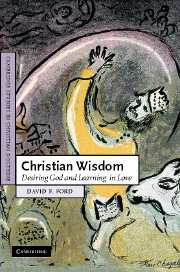Book contents
- Frontmatter
- Contents
- Acknowledgements
- Introduction: theology as wisdom
- 1 Wisdom cries
- 2 A wisdom interpretation of scripture
- 3 Job!
- 4 Job and post-Holocaust wisdom
- 5 Jesus, the Spirit and desire: wisdom christology
- 6 Learning to live in the Spirit: tradition and worship
- 7 Loving the God of wisdom
- 8 An inter-faith wisdom: scriptural reasoning between Jews, Christians and Muslims
- 9 An interdisciplinary wisdom: knowledge, formation and collegiality in the negotiable university
- 10 An interpersonal wisdom: L'Arche, learning disability and the Gospel of John
- Conclusion: love's wisdom
- Index of citations
- Subject index
8 - An inter-faith wisdom: scriptural reasoning between Jews, Christians and Muslims
Published online by Cambridge University Press: 22 September 2009
- Frontmatter
- Contents
- Acknowledgements
- Introduction: theology as wisdom
- 1 Wisdom cries
- 2 A wisdom interpretation of scripture
- 3 Job!
- 4 Job and post-Holocaust wisdom
- 5 Jesus, the Spirit and desire: wisdom christology
- 6 Learning to live in the Spirit: tradition and worship
- 7 Loving the God of wisdom
- 8 An inter-faith wisdom: scriptural reasoning between Jews, Christians and Muslims
- 9 An interdisciplinary wisdom: knowledge, formation and collegiality in the negotiable university
- 10 An interpersonal wisdom: L'Arche, learning disability and the Gospel of John
- Conclusion: love's wisdom
- Index of citations
- Subject index
Summary
If Christian theology can fruitfully be seen as seeking wisdom, what about its relationship to other faiths? This chapter addresses that question through a case study of the practice of scriptural reasoning, understood as a wisdom-seeking engagement with Jewish, Christian and Muslim scriptures. Its origins, practices, understandings and social settings are described and discussed, with some concluding remarks on its possible contribution to the public sphere in the twenty-first century. The Bible has been the main resource for Christian wisdom through the previous seven chapters, where it has also been related to traditions of Christian worship, scholarship and theology, with some attention to Judaism. The thrust of those chapters makes further engagement with Judaism and with other faiths not only unavoidable but desirable and even urgent. In particular it follows from the eighth thesis for the interpretation of scripture, Christians need to read the Bible in dialogue with diverse others outside the church, and by its accompanying maxim and appeal: Let conversations around scripture be open to all people, religions, cultures, arts, disciplines, media and spheres of life. Let us read for the sake of friendship with all! (see p. 87 above).
Core identities in conversation
There are many convergent reasons why it is sensible for inter-faith engagement among Jews, Christians and Muslims to make their scriptures a primary focus. Each tradition's scripture is at the heart of its identity. This is so in rather different ways, but recognising those differences can be a source of illumination to each.
- Type
- Chapter
- Information
- Christian WisdomDesiring God and Learning in Love, pp. 273 - 303Publisher: Cambridge University PressPrint publication year: 2007
- 1
- Cited by



